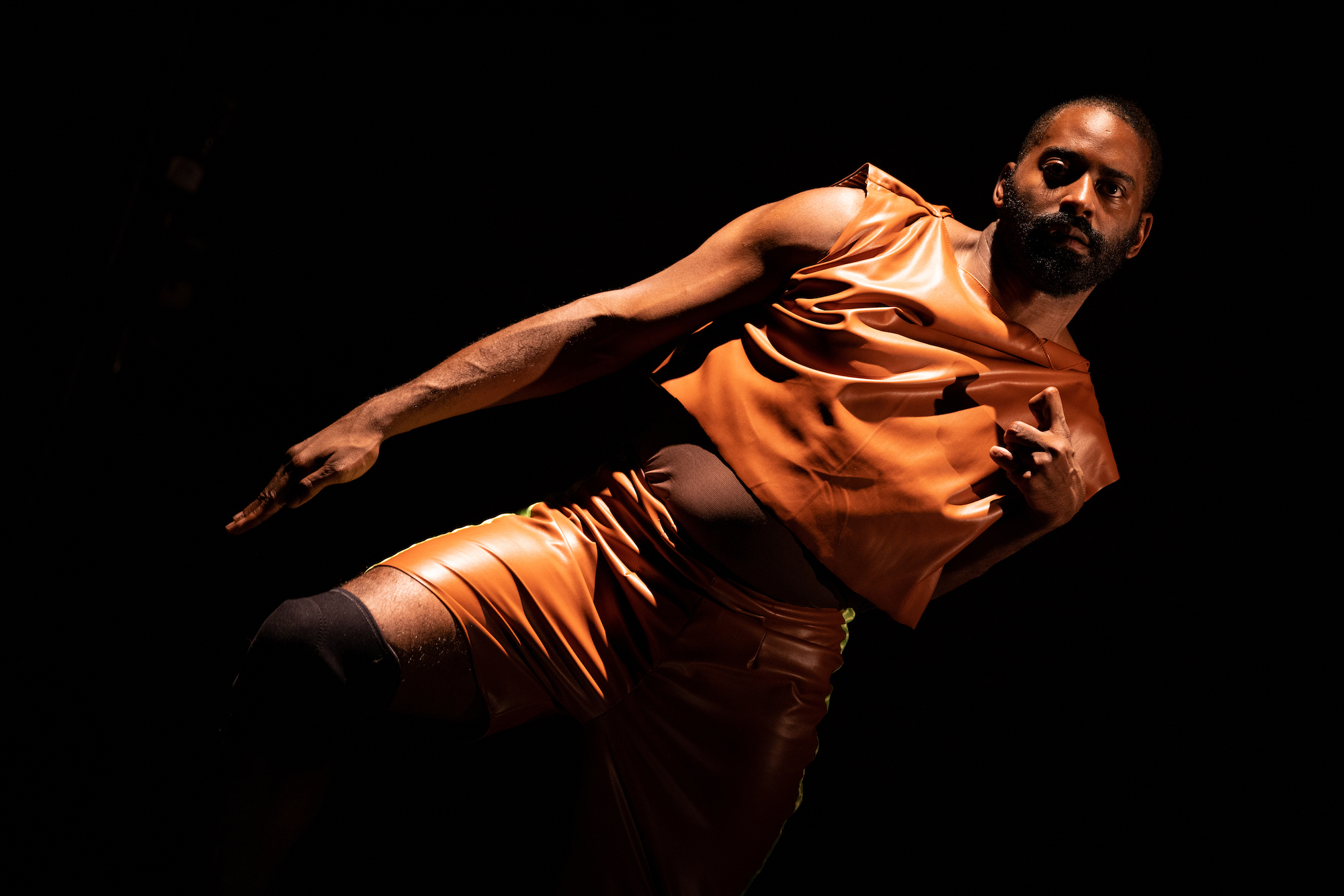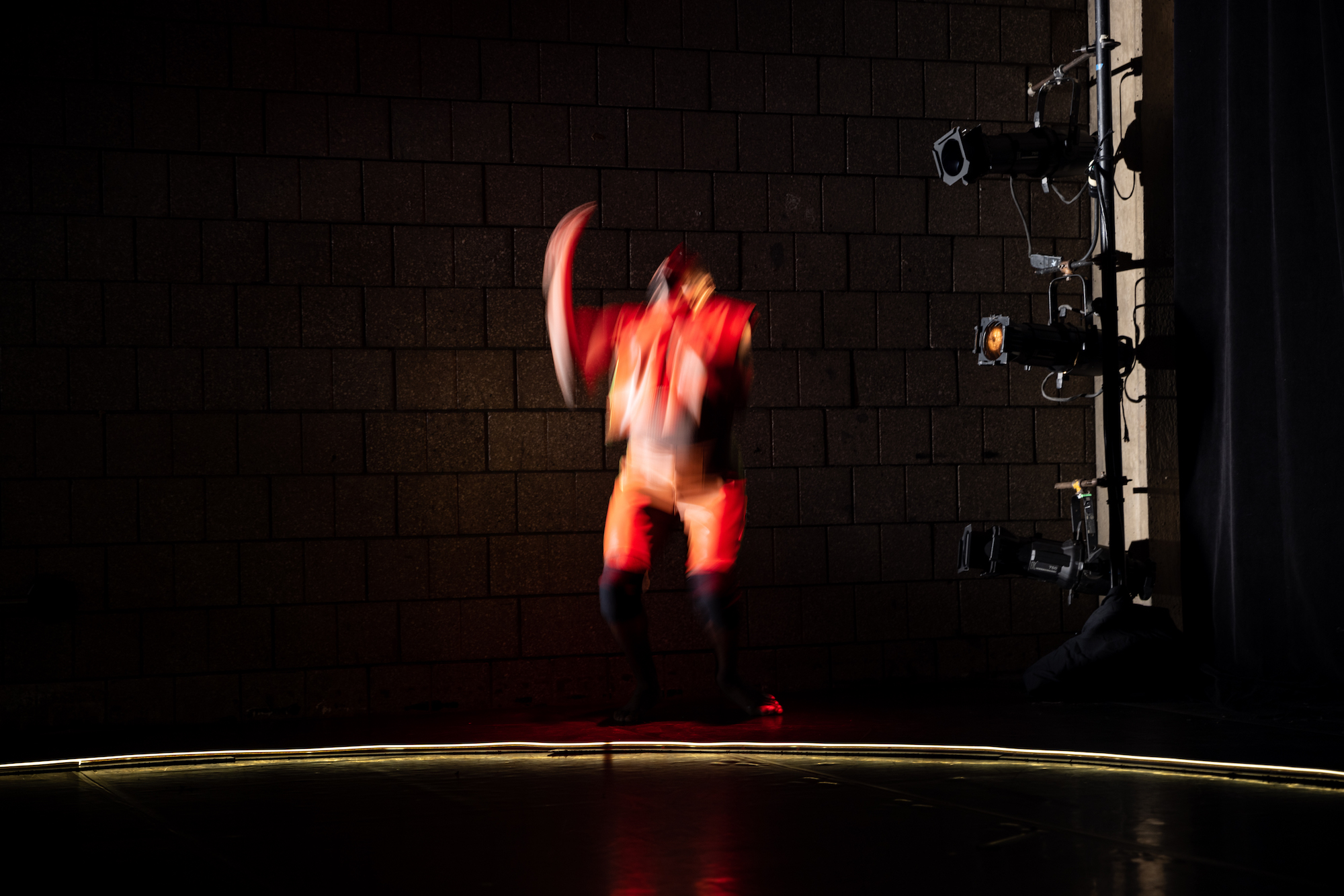Athleticism
Share:
The Athleticism of Rest
I descended from a plane out of Chicago, still steamy from the hotbeds of a world premiere at the Museum of Contemporary Art, to quickly enter my own production residency back in New York. Another world premiere, this time my own, and I was tired. I’m a disabled dancer who readily makes works that unpack the nature of a word to export meaning. In my first–ever solo, PHYS ED (2016, 2018), I interpreted the awkward and scarring pageantry of physical prowess as a lyrical rite of spring for a disabled person in P.E. class. In Many Ways to Raise a Fist (2019), I thought about “protest” and its closed fist, its opened fist, its potential. In VITRUVIAN (2022), I became that ideal image and created a kaleidoscopic reality wherein the famed sketch takes on my backstory, and I take on its. Through this process, the ideal was tested.
Jerron Herman, image of Jerron, a dark skinned Black man in a rustic tunic with green accents, leaning to the side, 2022 [photo: Maria Baranova; courtesy of the artist]
I approached my collaborators on the first day of rehearsal with an overworked quad muscle that wouldn’t release. The composers and designers had all done their jobs, and it was my turn to dance, but I’d come in earlier to try to muscle through an unfinished section and exacerbated my right quad even more. Even as I sat to relay welcoming and a timeline of the residency through to our premiere, I felt my body screaming. Failure crept up like water coming to a boil, and I suddenly became overwhelmed. I gave my wonderful producer clues to my fatigue but never said the word “rest.” When I finally broke, there was complete understanding. My collaborators looked at me like a beautiful chimera with a singular voice, and they knowingly agreed to let me leave for the day. I made little concessions of triage—I’ll stay through another section, maybe I can direct aspects of design from my bed while icing and sitting on my massager—but it was unnecessary. I was absolved of my work for the day.
But wasn’t my work my worth? Wasn’t my output the reason this chimera appeared? No. The real labor I’d done preceded my entry into the “performance” space. In the end, we premiered well, and the work is currently touring—a recurring recompense for our kind fitness.
Maybe in the future I’ll speak before my body does.
Jerron Herman, image of Jerron, a dark skinned Black man, blurred in movement against a brick wall, 2022 [photo: Maria Baranova; courtesy of the artist]
In my next solo, Lax (2023), I’m faced with a different conceptual athleticism, one that scares me. By naming “relaxation” (even abbreviated, it calls for more potency), I must now work to convey it. The labor transforms here: Instead of hours spent building in a studio, I must ask what my dreaming time is like. The solo is multifarious as a dance, an artistic film, and now an essay, so its labor is already distributed by thirds. A mercy. The actual dance need not encapsulate all the meaning but can instead disperse like chimerical collaborators. Members of my generation talk a mean game about liberation, but we often define it in terms of what it isn’t instead of what it is. Why? Accountability and consistency. These two words create deep indictments of fitness and ability. They are truthful, too. Reviewing them now, I see “accountability” as being, first, a site of freedom to my body, and, if I believe it, I must show it by increasing space for repair—and not by taking every doggone gig I can, just because. I see “consistency” as a repeated gesture, like drinking water, or taking a breath before a crisis. I’m learning that to prepare a dance, you have to prepare a world. In the past I scoured JSTOR for articles on Physical Education, protest, and the Vitruvian Man to craft a resolved simulacrum. But maybe I can’t hack the future. Maybe the future requires a presence that is itself a sacrifice of certain unnecessary presents.
Lax can be that future, in which I speak before my body does.
This very piece of writing symbolizes that work, as I am writing to an unknown time and an unknown me—this time with understanding. By the time I read this essay again, some part will have manifested.
Jerron Herman is a disabled dancer and writer who creates works to facilitate welcoming. He has premiered pieces at Danspace Project, Performance Space New York, The Kennedy Center, and the Whitney Museum of American Art. Herman regularly writes about art and culture, and currently serves on the Board of Trustees at Dance/USA. His awards include a 2020 Disability Futures Fellowship by the Ford Foundation and Mellon Foundation. In 2021 he received the Grants to Artists Award from the Foundation for Contemporary Arts and a Jerome Hill Artist Fellowship from the Jerome Foundation. His play, 3 Bodies, was recently published in Theater journal (May/June 2022).

